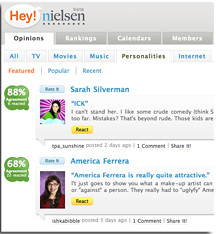“What’s a record? A cassette tape?” — my son, 2007
“What’s a magazine stand? A dust cover?” — his son, 2037
It might look clunky at a glance, but it’s the first generation sneak peek of the future. And like most technological breakthroughs that shock the system, the Kindle, a pricey and apparently improved e-reader, is no exception.
There were 3,200 posts and counting, just yesterday, equally split between positive and negative opinion. There were 398 reviews on Amazon, delivering a divided 2.5 stars. And while Seattlest jumped with comments that included “I wouldn't use it if someone gave it to me for free,” Barnes & Noble saw its stock drop 5 percent.
All because of hyperbole before the first Kindle could ship. Yet, very few people even mentioned this fact. It was too late, with just one more example of how bloggers follow media. Social media chimes in on any story when it seems especially hot. If they don’t, their readers will be discovering new blogs, maybe better.
Here are some highlights that struck me yesterday.
"This is a disruptive approach, the sort of thing only a market leader could pull off. It changes the world in a serious way." — Seth Godin with the marketing perspective.
“It’s not going to revolutionize the industry overnight, though it sounds like Amazon is going to take this business seriously and continue to invest in it.” — Joseph Weisenthal with the tech perspective.
“Whether this will be the death of print concerns me less than if it will be yet another slow down in reading complete books -- the physical or digital kind,” — Valeria Maltoni with the human perspective (my favorite kind).
“That Jeremy is probably right. I’m excited about the new reader to be sure. But getting geeks like me excited by a new “shiny toy” is pretty easy. Getting a large market excited? That’s a LOT harder.” — Robert Scoble with the geek predictor perspective.
“So unless you live in a dark cave (without Wi-Fi) you know that the Gadget News of the Day was Amazon's release of its eBook reader called the Kindle.” — Danny Dumas, with the recap perspective, including Jose Fermoso’s roundup of eight more opinions.
Did anyone notice the media has already embraced this? They’re on the subscription list. It makes them relevant; expect many more articles ahead.
So there you go. Maybe it will be Kindle and maybe not. But there are truths inside the truth because this is playing out much like the iPhone. There was a split decision a few months back. A lot of people came out for and against it. It was all kind of silly.
But today, all that conversation is irrelevant because Apple sold 1.12 million iPhones last quarter, representing 27 percent of the smart phone market in the United States and 3 percent of the overall cell phone market.
Not bad for Apple’s first phone.
Unless there is a serious technological flaw, like charging you to put your own content on it (oh right, there is) you can expect the same with Kindle or the second generation reader that someone is already busy working on. But I don’t want to play guessing games. Instead, I’ll offer two observations.
The hyperbole is real.
Sometimes social media gives permission to craft a runaway opinion for the sake of having one. And there is nothing wrong with that. Opinions are like bottoms and everyone has one. In the age of glass bathrooms, full moons are not only invited, but some say they’re required.
The future is polar.
The Kindle aside, the technology behind it represents an opportunity to educate everyone on the planet (once there is a price point drop), giving them access to the best books ever written. And, it also represents an opportunity to enslave humankind by filtering future content and killing the last refuge of reader privacy at the same time.
“Cool,” some say. “How can I list my blog and get paid?”
Good night and good luck.

“What’s a magazine stand? A dust cover?” — his son, 2037
It might look clunky at a glance, but it’s the first generation sneak peek of the future. And like most technological breakthroughs that shock the system, the Kindle, a pricey and apparently improved e-reader, is no exception.
There were 3,200 posts and counting, just yesterday, equally split between positive and negative opinion. There were 398 reviews on Amazon, delivering a divided 2.5 stars. And while Seattlest jumped with comments that included “I wouldn't use it if someone gave it to me for free,” Barnes & Noble saw its stock drop 5 percent.
All because of hyperbole before the first Kindle could ship. Yet, very few people even mentioned this fact. It was too late, with just one more example of how bloggers follow media. Social media chimes in on any story when it seems especially hot. If they don’t, their readers will be discovering new blogs, maybe better.
Here are some highlights that struck me yesterday.
"This is a disruptive approach, the sort of thing only a market leader could pull off. It changes the world in a serious way." — Seth Godin with the marketing perspective.
“It’s not going to revolutionize the industry overnight, though it sounds like Amazon is going to take this business seriously and continue to invest in it.” — Joseph Weisenthal with the tech perspective.
“Whether this will be the death of print concerns me less than if it will be yet another slow down in reading complete books -- the physical or digital kind,” — Valeria Maltoni with the human perspective (my favorite kind).
“That Jeremy is probably right. I’m excited about the new reader to be sure. But getting geeks like me excited by a new “shiny toy” is pretty easy. Getting a large market excited? That’s a LOT harder.” — Robert Scoble with the geek predictor perspective.
“So unless you live in a dark cave (without Wi-Fi) you know that the Gadget News of the Day was Amazon's release of its eBook reader called the Kindle.” — Danny Dumas, with the recap perspective, including Jose Fermoso’s roundup of eight more opinions.
Did anyone notice the media has already embraced this? They’re on the subscription list. It makes them relevant; expect many more articles ahead.
So there you go. Maybe it will be Kindle and maybe not. But there are truths inside the truth because this is playing out much like the iPhone. There was a split decision a few months back. A lot of people came out for and against it. It was all kind of silly.
But today, all that conversation is irrelevant because Apple sold 1.12 million iPhones last quarter, representing 27 percent of the smart phone market in the United States and 3 percent of the overall cell phone market.
Not bad for Apple’s first phone.
Unless there is a serious technological flaw, like charging you to put your own content on it (oh right, there is) you can expect the same with Kindle or the second generation reader that someone is already busy working on. But I don’t want to play guessing games. Instead, I’ll offer two observations.
The hyperbole is real.
Sometimes social media gives permission to craft a runaway opinion for the sake of having one. And there is nothing wrong with that. Opinions are like bottoms and everyone has one. In the age of glass bathrooms, full moons are not only invited, but some say they’re required.
The future is polar.
The Kindle aside, the technology behind it represents an opportunity to educate everyone on the planet (once there is a price point drop), giving them access to the best books ever written. And, it also represents an opportunity to enslave humankind by filtering future content and killing the last refuge of reader privacy at the same time.
“Cool,” some say. “How can I list my blog and get paid?”
Good night and good luck.





















